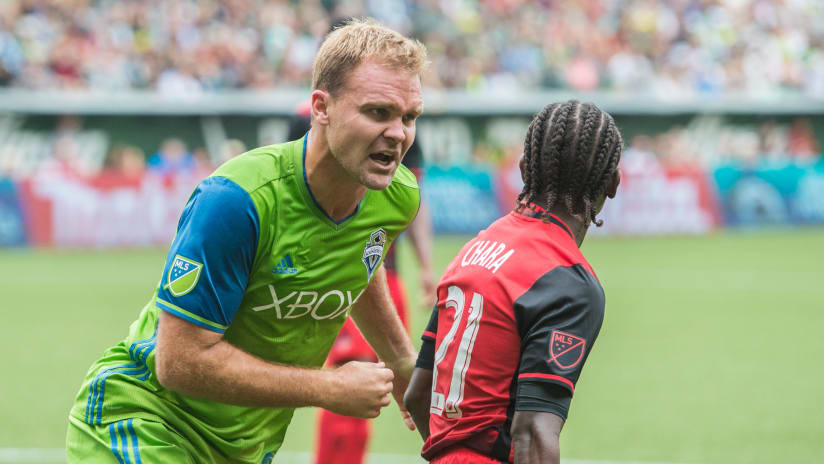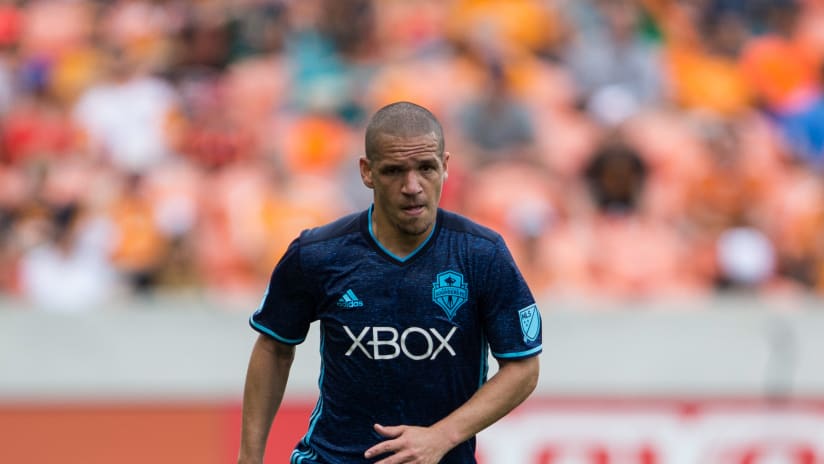So much for that emphatic turnaround.
After smashing FC Dallas 5-0 on Wednesday to invite whispers that the Sounders’ season was in the midst of a playoff-hunting reversal, Sunday’s matchup in Portland arrived with perhaps even more fanfare than normal from north of the Columbia River. The Sounders needed the points and suddenly looked as prolific as they had all season.
A win - or even a quality performance and a result - in Portland would indicate a new dawn for Seattle after a tumultuous first half of the season. The Sounders had never been last in the Western Conference that late in the season before. A result against their bitterest of rivals and that memory starts to fade.
It did not happen that way. The Timbers relied on their blitzkrieg style after a frenetic opening half hour, grabbing two goals from Diego Valeri and a final cherry from Fanendo Adi to sprint away 3-1 winners. The win vaulted Portland into a playoff position and kept Seattle where it was from the start: second-to-last in the conference and wondering when that turnaround was really going to show itself.
Whenever it arrives, Sunday was not the day. Here’s three things we learned.
The New Portland
Since 2014, and especially since 2015, the Timbers basically threw out their former formula under coach Caleb Porter and went direct. Exceedingly direct, in fact, to the point that the Timbers are out-passed and out-possessed every week. That doesn’t particularly matter, though, if you can break well, and with Valeri as the center spoke on the attacking trident, there are few teams who can break more quickly and with more vigor.
The opening 30 minutes or so was a frenetic back-and-forth, and it didn’t really favor either side. Both traded opportunities, but the Timbers hadn’t pulled back to allow the Sounders in all that much. By sinking their midfield inward, they pull attackers in and create space behind to run. Ultimately, sustained Sounders possession with no shot at the end would end up turning into robust Timbers chances. That was the idea anyway.
After the initial burst of nervous energy from both sides - no doubt fueled by the enormity of the match - the Timbers finally got into their strategic comfort zone over the final 15 minutes of the first half. They dropped, and they waited, and they pounced.
That’s exactly how they got the game’s first goal. The Sounders pressed in full, and the Timbers needed just eight total touches to go 100 yards. After Valeri’s cross erroneously found the net for the Timbers’ second (watch Valeri’s reaction - he did not mean it), that rapid build happened again on the Timbers’ third, which ostensibly put the game away. This time Portland needed just nine total touches to go from their own end line into a scoring position, Adi half-flubbing a shot and chipping it past Stefan Frei for a two-goal lead that held through the end.
Two end-to-end run of play goals, 17 total touches. Porterball indeed.
Finishing Lets Sounders Down, Again
In many ways this has been the season of “How-did-that-ball-not-go-in” for the Sounders. They’ve had so many near-misses through genuinely well-worked build-ups that it almost boggles the mind how few have actually gone through. The Sounders complete more passes per game than any team in the league and yet have one of the lowest goal totals in the country.
Simply stated, the Sounders have largely lacked the killer pass this year. That final ball that would unlock the box holding all these unwon Sounders goals and let them out. If the Sounders are indeed chasing that on the transfer market, that’ll help, but what about in the near term?
Thing is, even when the Sounders do get golden opportunities through quality chances, they’ve often been kept out by goalkeeping heroics, chance deflections or just simple poor touches. Jordan Morris had a golden chance early in the first half when a bouncing ball landed at his feet seven yards out. It ran to his left foot at an awkward height and Morris, unmarked, put it well wide. That would’ve put the Sounders up 1-0 and completely changed the game’s trajectory and narrative.
Later, with the Sounders trailing 1-0, Cristian Roldan only missed a golazo into the upper corner via an acrobatic Jake Gleeson save that left the stadium stunned. And not long after that, with the game at 2-0, Nelson Valdez had a chance to pound home a chance from 10 yards inside an empty corner of space in the box and put it eight yards over the crossbar.
“We had our chances. We created,” said Roldan, probably the most consistently quality Sounder on the day. “I think we got caught a little on the counter.”
In games like these, goals provide an emotional burst of energy uncommon to all but the most charged rivalry games. The Sounders had theirs and simply didn’t convert. In fact, they put six on target in the second half and managed to finish just one of them. This was where not having Clint Dempsey, who was suspended after picking up a red card on Wednesday, hurt the most. To snag an early goal on the road would’ve put all the pressure back on the Timbers, who would’ve then been tasked with coming back in a place they were favored.
But each chance in the run of play fell by the wayside. The Sounders’ lone goal came off a set piece, Chad Marshall beating Nat Borchers to the near post and climbing to smash through his third tally of the season. Even that was tinged with a bittersweet edge. The goal made Marshall, a center back, the second-leading scorer on the team.
Valeri Makes The Difference
Adi is probably the most outwardly visible attacker for the Timbers simply by dint of his voluminous goal totals. Many of them are so well-placed and served with such laser-guided precision, though, that it’s impossible not to look at the thrumming engine behind them. If Adi is on the end of most of Portland’s goals, Valeri is the one orchestrating them.
And boy was Portland happy to have their No. 10 back on Sunday.
Valeri had missed three consecutive games for Portland, a run in which the Timbers won zero games and scored a single goal in 270 minutes. Watching Valeri operate with slithery precision on Sunday, it was easy to see why he was so well missed. The Sounders had few answers for his creative edge, and he seemed to flow through the lines almost at will.
His two goals were the most overtly positive outward face of his production, but he did so much more than simply score. He led breaks, jump-started attacks, harried midfielders, made killer passes. Of Valeri’s 45 passes, a whopping 35 of them - that’s nearly 80 percent - were attempted in Seattle’s half. He more or less set up shop between Osvaldo Alonso and the Sounders’ back line and did his best to pry it all apart.
It was easy to see why the Sounders struggled defensively in a way they rarely have this season. Valeri was nigh unstoppable. Now to see if the Sounders can find one of their own.







